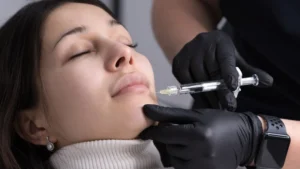Menopause is a natural biological process that occurs in women typically between the ages of 45 and 55. During this time, the body undergoes significant hormonal changes that can impact various systems, including the immune system. A weakened immune system can leave women more susceptible to infections and illnesses. However, there are steps for women which describe how to boost immune system during menopause? In this article, we will discuss some effective strategies for strengthening the immune system during this transitional phase of life.
Steps that How to Boost Immune System during Menopause?
1. Eat a Nutrient-Rich Diet
One effective way to boost the immune system during menopause is by eating a nutrient-rich diet. A diet that is high in vitamins, minerals, and antioxidants can help to support the immune system and protect the body against disease and infection.
Here are some specific steps that women can take to eat a nutrient-rich diet during menopause:
- Focus on whole foods: Instead of relying on processed or packaged foods, aim to eat a variety of whole, nutrient-dense foods. Examples include fruits, vegetables, whole grains, lean protein, and healthy fats.
- Incorporate immune-boosting foods: Some foods are particularly effective at supporting the immune system. These include citrus fruits (high in vitamin C), leafy greens (rich in vitamins and minerals), and garlic (known for its antiviral and antibacterial properties).
- Consume probiotics: Probiotics are beneficial bacteria that live in the gut and help to support a healthy immune system. To get more probiotics in your diet, consider eating fermented foods like yogurt, kefir, and kimchi.
- Stay hydrated: Drinking plenty of water can help to flush toxins from the body and support the immune system. Aim to drink at least 8-10 glasses of water per day.
- Consider supplements: While it’s always best to get nutrients from whole foods, supplements can also be helpful for filling any nutrient gaps. Speak with your healthcare provider to determine if any supplements are right for you.
Read more: How to Treat Menopause Body Odor?

2. Engage in Regular Exercise
Regular exercise is another important way to boost the immune system during menopause. Exercise has been shown to have a positive impact on immune function, reducing inflammation and promoting the production of immune cells.
Here are some specific steps that women can take to engage in regular exercise during menopause:
- Find an activity you enjoy: Whether it’s walking, running, cycling, swimming, or yoga, find an activity that you enjoy and that fits your lifestyle. This will make it easier to stick to a regular exercise routine.
- Start slowly: If you haven’t been active for a while, start slowly and gradually increase the intensity and duration of your workouts. This will help to prevent injury and make exercise feel more manageable.
- Aim for at least 30 minutes per day: Aim to get at least 30 minutes of moderate-intensity exercise most days of the week. This can be broken up into shorter bouts throughout the day if needed.
- Incorporate strength training: Strength training can help to build muscle mass and improve bone density, both of which are important for overall health during menopause.
- Get outside: If possible, try to exercise outside in the fresh air and sunshine. This can help to boost mood and vitamin D levels, which are important for immune function.
Read More: Is Menopausal Hair Loss Permanent?

3. Get Adequate Sleep
Getting adequate sleep is crucial for maintaining a healthy immune system during menopause. Sleep is when the body repairs and restores itself, and chronic sleep deprivation can weaken the immune system and increase the risk of illness and infection.
Here are some specific steps that women can take to get adequate sleep during menopause:
- Stick to a regular sleep schedule: Try to go to bed and wake up at the same time every day, even on weekends. This can help to regulate the body’s sleep-wake cycle and improve sleep quality.
- Create a relaxing sleep environment: Make sure your bedroom is cool, dark, and quiet, and consider using earplugs or a white noise machine to block out any noise.
- Limit screen time before bed: The blue light emitted by electronic devices can disrupt sleep patterns, so try to avoid using phones, tablets, or computers for at least an hour before bed.
- Practice relaxation techniques: Techniques like deep breathing, meditation, or progressive muscle relaxation can help to calm the mind and prepare the body for sleep.
- Seek treatment for sleep disorders: If you have trouble falling asleep or staying asleep, talk to your healthcare provider about treatment options. Sleep disorders like sleep apnea or insomnia can impact immune function and overall health.
Read More: If You Freeze Your Eggs Can You Still Get Pregnant?

4. Reduce Stress
Reducing stress is an important way to boost the immune system during menopause. Chronic stress can have a negative impact on immune function, making the body more susceptible to illness and infection.
Here are some specific steps that women can take to reduce stress during menopause:
- Identify sources of stress: Take some time to identify the sources of stress in your life, whether it’s work, family, or personal relationships.
- Practice relaxation techniques: Techniques like deep breathing, meditation, yoga, or tai chi can help to calm the mind and reduce stress levels.
- Stay active: Regular exercise can help to reduce stress and promote overall health and well-being.
- Connect with others: Spending time with friends and family, or participating in social activities, can help to reduce feelings of isolation and improve mood.
- Seek professional help: If you are struggling to manage stress on your own, consider speaking with a therapist or counselor who can provide additional support and guidance.

5. Consider Supplements
While a nutrient-rich diet is the best way to support the immune system during menopause, some women may benefit from taking supplements to fill nutrient gaps or support specific areas of health.
Here are some supplements that women may want to consider during menopause:
- Vitamin D: Vitamin D is important for immune function and bone health, and many women may not get enough through diet and sun exposure alone.
- Probiotics: Probiotics can help to support gut health and immune function, and may be particularly beneficial for women experiencing digestive issues during menopause.
- Omega-3 fatty acids: Omega-3s are important for heart health, brain function, and reducing inflammation in the body.
- Magnesium: Magnesium can help to reduce muscle tension, promote relaxation, and support bone health.
- Black cohosh: Black cohosh is a plant-based supplement that may help to reduce hot flashes and other symptoms of menopause.
- Ginseng: Ginseng is an herb that may help to reduce stress and support immune function.

Conclusion
In conclusion, menopause is a natural phase of life that can bring significant changes to a woman’s body, including changes to the immune system. By making simple lifestyle changes like eating a nutrient-rich diet, engaging in regular exercise, getting adequate sleep, reducing stress, and considering supplements, women can support their immune systems and overall health during this time.
FAQs
Here are some frequently asked questions about boosting the immune system during menopause:
Q: Can hormone therapy help to boost the immune system during menopause?
A: While hormone therapy can help to relieve some symptoms of menopause, it is not recommended as a way to boost the immune system.
Q: Are there any foods that can specifically boost the immune system during menopause?
A: Foods that are rich in nutrients like vitamin C, vitamin D, zinc, and antioxidants can help to support the immune system during menopause. Some examples include citrus fruits, leafy greens, nuts and seeds, and lean protein sources.
Q: How long does menopause last?
A: Menopause typically lasts for several years, with the average age of onset being 51 years old. However, the duration and severity of symptoms can vary widely among women.
Medical references:
- National Institute on Aging. (2018). Menopause. https://www.nia.nih.gov/health/menopause
- Harvard Health Publishing. (2019). How to boost your immune system. https://www.health.harvard.edu/staying-healthy/how-to-boost-your-immune-system
- American College of Obstetricians and Gynecologists. (2020). Menopause FAQs. https://www.acog.org/womens-health/faqs/menopause



